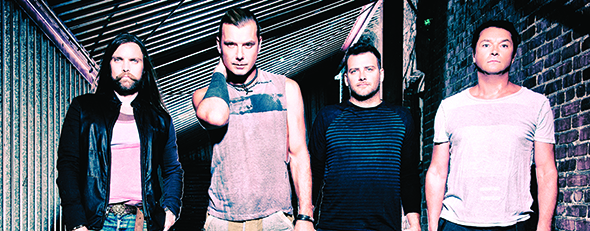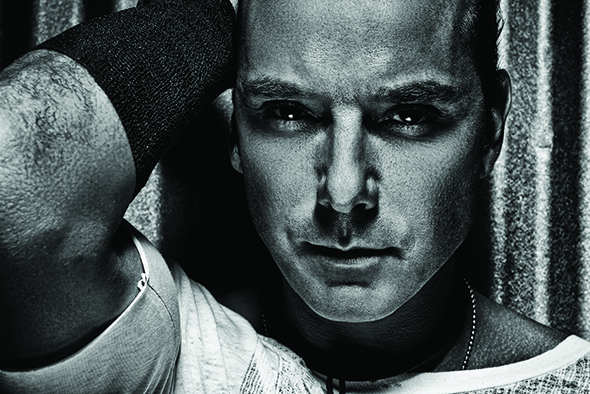Bush

Throughout the ‘90s—and even today—there are only a handful of bands who actually communicate on a deeper level with their audience through a combination of musical and lyrical content. With six studio albums and a multitude of top ten singles, the multi-platinum and highly successful band, Bush, continues to do just that. The rock and roll post-grunge veterans have sold over ten million records in the U.S. alone and continue to break down musical barriers with their artistic expression, even within such a heavy and digitally run musical market. They are one of the most commercially successful bands of the ‘90s and, begin- ning with the release of their first debut album, titled Sixteen Stone, continue to make unparalleled progress with their cre- ations. Following Bush’s most current album, Man On The Run, the band is slated for a full U.S tour and is kicking it off here In San Francisco. SOMA had the opportunity to catch up with British front man Gavin Rossdale and speak with him candidly about their most current album, working with Grammy award- winning producer Nick Raskulinecz, their project with Pandora and recording at Foo Fighter front man Dave Grohl’s studio.
Nick Raskulinecz produced Man On The Run. How was your experience working with him?
He was just amazing. A Lot of people recommended him to me. Chino from the Deftones, Dave Grohl and Amy Lee from Evanescence. He’s a great person and a great motivator. I also did quite a few of the songs with producer Jay Baumgardner, who we worked with In Los Angeles. We did about five or six songs in L.A. and did about nine songs with Nick, which was a great experience.
You recorded at Studio 606, Dave Grohl’s Studio. How would you describe that experience?
The studio had beautiful sound. Nick helped build Studio 606 with Dave. The old Sound City board was the last board we recorded our last Bush drums on which was a good symmetry for that. It’s a recording studio but it really feels like hallowed ground because of the history with the Foo Fighters and Nirvana. It’s a great set up, which was really generous of Dave.
On your album commentary you spoke a little about the track “Man On The Run”, setting up the album aesthetically. Can you elaborate on that a bit?
Coming from London with the whole DJ movement, and it being around longer than I’ve been playing music, I have a deep love for club music and a deep understanding of it all and have an appreciation of it. I felt like the gap was widening between rock music and dance music. I wanted to find a way back to peoples consciousness, and I just figured subliminally people are so turned on to DJ’s now. Just trying to be as dynamic as possible .
What was the creative process like for you on this album?
It felt really free. Just coming in and having been inspired by being on tour so much over the last few years with Bush. We Just wanted to sort of consolidate the return to get a record out in a reasonable time. It was liberating to come back and just dive into the studio and not really put any pressure on the songs. I wanted to make sure that the record could really compete with the existing catalog. The songs have to be of a certain standard or else they just can’t compete with songs like “Comedown” or “Everything Zen”. It’s a really magical time for me as a writer to have the chance to just write everyday.

You recently teamed up with Pandora for a special promotion in which Bush did surprise performances for fans. How was that experience?
It was amazing! The first thing that occurred to me was that coming from a traditional news outlet, the big news outlets that we’ve all grown up with, you go to those offices and it just seems like they’re all in flux, just a labyrinth behind the scenes and media, and when you go to Pandora or to Spotify [and] you realize this is where everyone is. Pandora was pretty amazing because we sat down in the conference room and they showed who was playing which songs by Bush. You could do a complete data-driven analysis. We had the whole day of people clicking the thumbs up and they would literally be transported into our backdrop. The setup was massive. They did a really fantastic job. People were shocked.
Did the fans have any idea that Bush was calling them?
Not at all; they were just hitting the thumbs up on their Pandora. I kind of liked the idea that they weren’t forewarned. People were freaking out. I didn’t wanna stop; I was really into it for the entire day. I think the hardest thing is to be surprising. It’s one of the few things left, you know.
It’s been twenty years since the release of your first album Sixteen Stone, and it’s safe to say that you have experienced a lot musically and artistically over the years. With that said, where would you say Bush stands today as a band?
Were just trying to make the rock music that we love and it’s really hard to know. If anything, it’s such an insane world of smoke and mirrors and social media numbers that it’s hard to know. The only thing I could ever gauge it off is to sort of live my life as though nothing is happening. Just live my life as a working musician. The beauty and the curse of today’s world is that there’s a slice of the pie for everyone, whatever you want, it’s out there. Now that there’s no perspective on sales you really have to go and play live. It’s really hard to gauge who is listening to what. The radio is fantastic and continue[s] to support us. The best part you can do, I feel, is just to do what you do with quality and with conviction.
Bush Is kicking off their tour here In San Francisco at The Masonic. What are your thoughts for this upcoming tour? We have really good friends up In San Francisco. We love coming up there. For me, the history of San Francisco is second to none because I grew up in City Lights bookstore, and the whole Beat thing. Ginsberg was my guide to writing lyrics. Playing in SF is just hallowed ground and a great cultural center.
Text by William Lankford